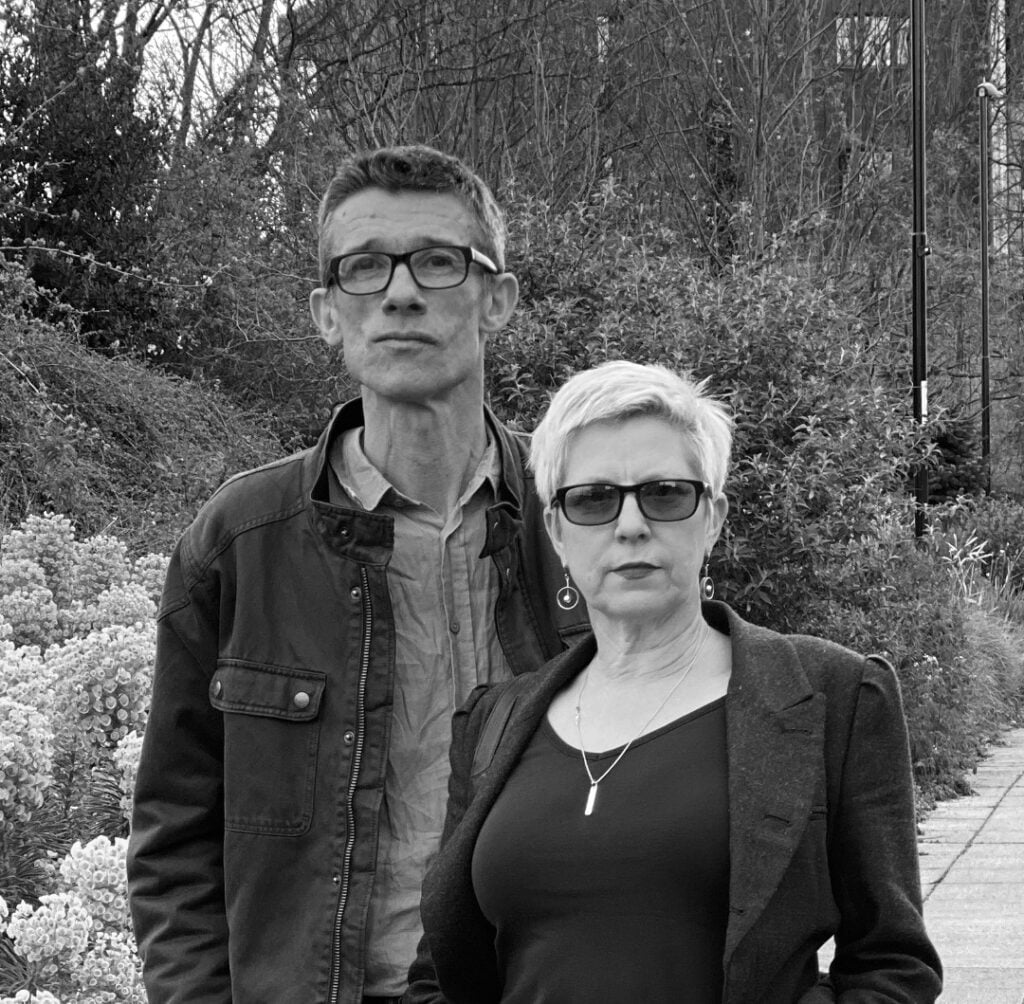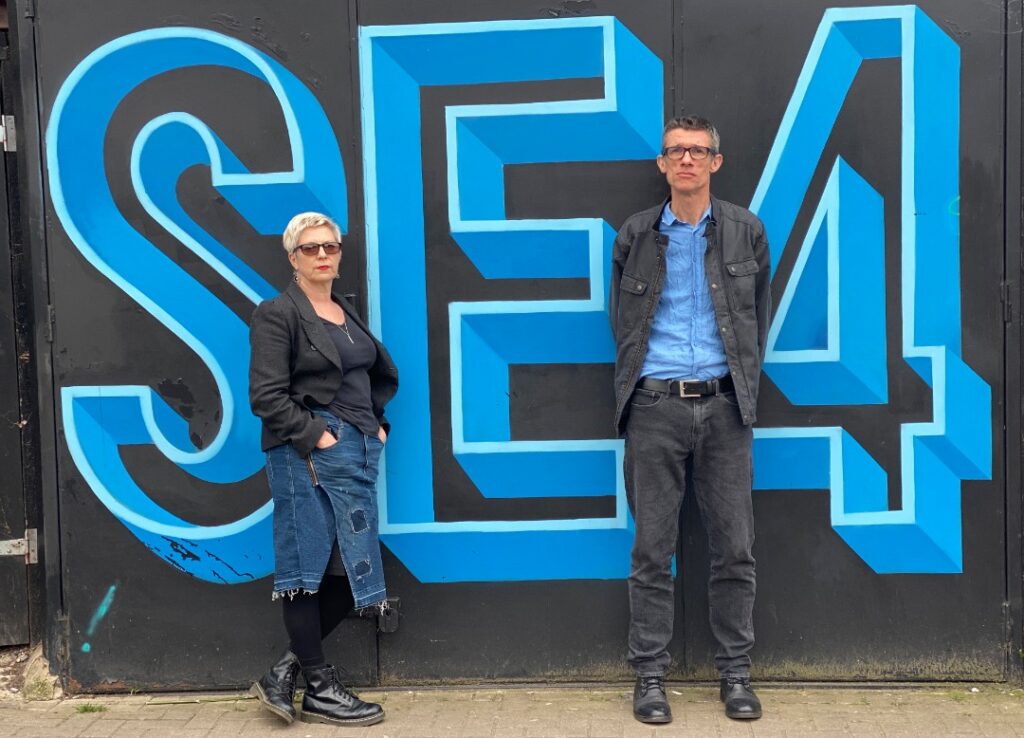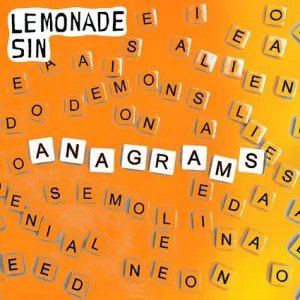The alt-pop group Lemonade Sin was founded by Lee Friese-Greene and Simon Aldous and has offices in both London and Devon. Their beautiful indie-pop style has echoes of every great boy/girl duet you’ve ever heard, from Nancy and Lee to the Pastels and Belle & Sebastian to the Human League, even though they list the Velvet Underground and Abba as their primary influences. Each of the nine tracks on their debut full-length album, Anagrams, is an anagram of Lemonade Sin, which is itself an anagram of Simon and Lee. The end result is a diverse selection of songs that veers between disco, shoe-gaze, folk, grunge, and back again, but which are all connected by the love of vintage synth sounds, dueling voices, rich harmonies, jangly guitars, and guitars that sing in unison.
Two-thirds of the band Pale Blue Eyes, Lucy and Matt Board, who both play on all the tracks, recorded and mixed it at Penquit Mill Studio in Devon. Melanie Nods, a preview song, is currently accessible on Bandcamp and all common streaming platforms. Check out the latest album and the exclusive interview below:

1. Can you tell us a bit about where you come from and how you got started?
Lemonade Sin: We’re both from south-east London though Lee now lives in Devon. We’ve known each other since we were at school and had been in various bands before, but had both been having a break from making music. Then Lee got in touch with Simon, suggesting we try writing some songs together. Neither of us had done that before and Simon was a little freaked by the idea – he had always considered it such a personal thing to do. But our first attempt turned out really well so we decided to keep going.
It was quite a barrier to overcome to start showing each other very early raw and undeveloped ideas rather than waiting for them to be fully worked out, because it’s very exposing but now we’ve crossed that barrier it can be very liberating
While we are the band’s songwriters, there are now six of us in the band so that we can play the music live.
2. Did you have any formal training or are you self-taught?
Lee: A few guitar lessons at school but mostly self-taught by playing my way through the Beatles Complete as a teenager. And just listening to a lot of music.
Simon: I don’t play any instrument apart from a little bit of (self-taught) melodica. When I began songwriting, I spent a lot of time analysing records I liked, thinking about what made them so good, and later consciously playing around with song structures. These days it feels more intuitive.
3. Who were your first and strongest musical influences and why the name Lemonade Sin?
Lemonade Sin: The official band answer to this question is that are main influences are the Velvet Underground and Abba. We love the perfectly put together pop of Abba but we also like the scuzziness of the Velvets. We wouldn’t want to be too polished.
Bands we listened to early in our lives that inspired us to make our own music include (for Lee) the Beatles, Blondie and X-Ray Specs, (for Simon) the Human League and Buzzcocks.
When we were trying to come up with a band name, we put “Simon and Lee” into an anagram generator, and Lemonade Sin was one of the possibilities that came up. In a parallel universe we are called Dames Online.
4. What do you feel are the key elements in your music? How would you describe your sound?
Lemonade Sin: We’re both lead singers and we think the vocal arrangements are very important, that our two voices are working together – sometimes aided by other band members. We also like to put a bit of thought into our lyrics.
As far as musical styles go, we’re pretty eclectic. We listen to a wide range of different music and take influence from all over the shop. At the moment jangly guitars and retro synth sounds seem to feature quite a bit.

LS We’re always listening to new stuff (or old stuff we hadn’t heard before) and inevitably we’re influenced by it. Lots of reviews have said we have a strong 80s or 90s feel, which isn’t something we’re particularly conscious of, but they also say we have an original take on it and great songs, so that’s alright.
6. Why do you make music? What do you hope your listeners will get from your songs?
Lee: Why does anyone make any art? It’s a human response to a fucked-up world, trying to make sense of things, escapism maybe … and because it brings moments of complete joy. It also can make you sad, frustrated and far too introspective!
For me writing songs is an itch that needs to be scratched so am not really concerned what listeners get from the music we make although it’s always nice when people say they like it and I’d like to think people appreciated the craft and maybe also sometimes a lyric will chime with them or a annoyingly catchy bit of melody will stick with them for a bit and put a smile on their face.
Simon: I’d like to think that anticipating people’s reactions doesn’t influence how we write songs, but when we come up with something we’re pleased with, I always hope other people will like it too. When I listen to music, the stuff I like most triggers some kind of emotional response, whether it be happy or sad or just making me want to dance – so I suppose that’s what I’m hoping others will take from our music.
7. Do you feel that your music is giving you back just as much fulfilment as the amount of work you are putting into it?
Lemonade Sin: We find the creative process incredibly satisfying, just coming up with a good melody or a lyrical line you’re pleased with is great, and going into the studio to turn that into something finished that realises the potential of those first ideas is our idea of a very good time, so yes, we find the work we’re putting into music fulfilling in itself. That doesn’t mean we’re not ambitious for it to do well – we want to give it every opportunity to be heard.
8. Could you describe your creative processes?
Lemonade Sin: As co-writers, we’ve found it helpful to have an overall theme for a set of songs. In the case of our Anagrams album, all the song titles are anagrams of each other.
We started with a list of 20 or so possible song names and discussed what each one could be about,. In that respect, a lyrical idea was almost always the starting point.
Beyond that there is no regular process – one of us might come up with some ideas for words or part of a tune, but a big part of it is that we keep passing each song back and forth, editing, embellishing, improving until we’re both happy with it.
We’ve also tried immersive songwriting, a technique where you shut yourself in a room for 12 hours and force yourself to write lots of songs in that time. You have no distractions and there isn’t time to think too carefully about what you’re doing, or to censor yourself. It’s amazingly effective at generating new ideas.
9. What has been the most difficult thing you’ve had to endure in your life or music career so far?
Lemonade Sin:: Our physical distance. We live 200 miles from one another; we can’t just pop round to each other’s homes to work on music. You can do a lot remotely these days – and we do – but we have found we ultimately need to be in the same room to properly finish a song.
10. On the contrary, what would you consider a successful, proud or significant point in your life or music career so far?
Lemonade Sin: Probably the last month or so. We’ve been working on our Anagrams album for about three years, and now it’s out and has had some really lovely reviews that make us feel people are understanding and appreciating what we’ve done. And we did a great London show which had a fantastic crowd. Getting that kind of response is wonderful and spurs you on to do more.
The whole process has reminded us how important songwriting, recording and performing are to us. It was a major part of us that we had allowed to slip.
KEEP IN TOUCH:
FACEBOOK | INSTAGRAM | TWITTER | SPOTIFY | BANDCAMP | YOUTUBE

Photo credits: Gayl Gordon

